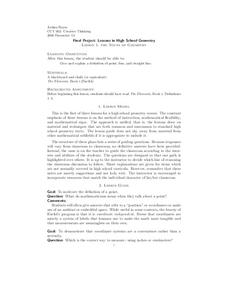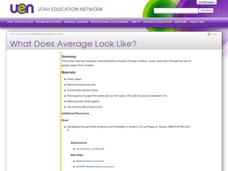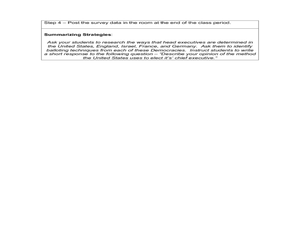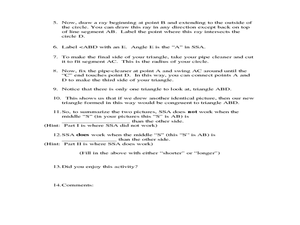Virginia Department of Education
Independent and Dependent Variables
Investigate the relationship between independent and dependent variables. Individuals begin by identifying independent and dependent variables from different problem situations. Then, using specific guidelines, they create posters...
Curated OER
Math: Road Trip
Twelfth graders use road maps to calculate the distance between two locations. They estimate the cost for fuel and the miles per gallon. They consider other factors such as geography, road conditions, and traffic that may impact the cost.
Harvard University
The Nouns of Geometry
Socratic questioning to teach Euclidean geometry? "The Nouns of Geometry," followed by "The Verbs of Geometry," and the misfit, "A Beginner's Story - The Equilateral Triangle" are designed to encourage learners to explore various...
Curated OER
The Facts, Gimme the Facts!
Students engage in a variety of activities which help them memorize their times tables. There are some very good ideas imbedded in this plan of how to systematically teach the basic facts in a way that help students retain what they learn.
Curated OER
Property Lists for Quadrilaterals
Young scholars establish classifications of shapes by various properties (angles, sides, etc.). They introduce the important properties of common shapes. Students develop an awareness of the wide variety of ways the 2-D shapes can be alike.
Curated OER
Fun with Math using Magnetic Force
Sixth graders explore and discuss the effectiveness of magnets in different situations. For this math lesson, 6th graders discuss rate and graphs after exploring with magnets using different restrictions on the magnets. They analyze...
Curated OER
Geometry Finding Pentominoes
Students explore the characteristics of geometric shapes. In this geometric shapes lesson, students use tiles to draw pentominoes. Students participate in various learning center activities focused on configuring pentominoes.
Curated OER
Am I Seeing Double?
Students explore symmetrical design and lines of symmetry. For this fourth grade geometry lesson, students create their own symmetrical design and identify and label the lines of symmetry. Students use one design to create a...
Curated OER
What Does Average Look Like?
Fifth graders explore the concepts of range, median, mode, and mean through the use of graphs drawn from models. They use manipulatives to represent data they have collected within their groups, and compare the differences between mode,...
Curated OER
Algebra/Geometry Institute Summer 2009 - Triangles and the Pythagorean Theorem
Seventh graders find the perimeter and area of triangles. In this finding the perimeter and area of triangles lesson, 7th graders find the perimeter and area of triangles given two sides. Students find the missing side by...
Curated OER
They're Everywhere! They're Everywhere!
Students gain an appreciation of the polygons and polyhedrons around them that make their world one of order and strength. They build polygons and polyhedrons, and then construct airplanes out of polygons.
Curated OER
What Are My Chances?
Students calculate probability. In this lesson on probability, students use given data to calculate to chances of a given event occurring. Many of the calculations in this lesson are applicable to daily life.
Curated OER
Special Segments of Triangles Jigsaw Activity
Students identify the special segments of triangles, the median, angle bisector, altitude, and perpendicular bisectors.
Curated OER
Pent-up Pentominoes
Students explore pentominoes in this activity. They build shapes as directed and color the tiles on their grid sheet.
Curated OER
Finding Area of Similar Figures
Students explore the concept of finding area of similar figures. In this finding area of similar figures instructional activity, students use pattern blocks to construct similar figures. Students trace their construction and find the...
Curated OER
Are you an Animal Sleuth?
Students define and identify both wild and domestic animals as well as mammals and non-mammals. In this animal safety lesson, students distinguish between animals that can carry rabies from those that cannot. Students use stuffed animals...
Curated OER
Polygon Perimeters
Fourth graders practice finding the perimeter of shapes. In this measurement lesson, 4th graders review the meaning of perimeter and work in groups to draw polygons with differing perimeters. Students share their polygons...
Curated OER
Chocolate Preferences Voting and Graphing Techniques
Students practice sampling and graphing techniques. In this data collection and interpretation lesson, students write and conduct surveys about chocolate preferences and then collect their data. Students graph the data in order to...
Curated OER
Generic vs. Brand Name
Students compare and contrast generic and brand name products and the costs of producing each. They explore the "Bargain Basement" section of the ING website, participate in a soda taste test, and tally the results of the taste test on a...
Curated OER
Which Triangles are Right
Students apply properties of right triangles to solve problems. In this geometry lesson, students identify axioms and theorems using examples.
Curated OER
Why Doesn't SSA Work?
Students investigate the relationship between angles and their sides. In this geometry lesson, students prove why SSA does not work as a true angle side relationship theorem.
Curated OER
Reading the River - Biological Classification
Youngsters create a list of grocery store items and then work together to categorize them as if they were setting up the shelves of the market. Then they are given a box of miscellaneous objects to practice categorizing. With these two...
Curated OER
Investigating Quadrilaterals
Fourth graders discuss the various attributes of quadrilaterals. In groups, they use the attributes to sort quadrilaterals into different classes and a hierarchy. They review the new vocabulary and attributes with a partner to end the...
Curated OER
As a Matter of Fact!
Students explore matter. They use a formula to measure the volume of matter.

























